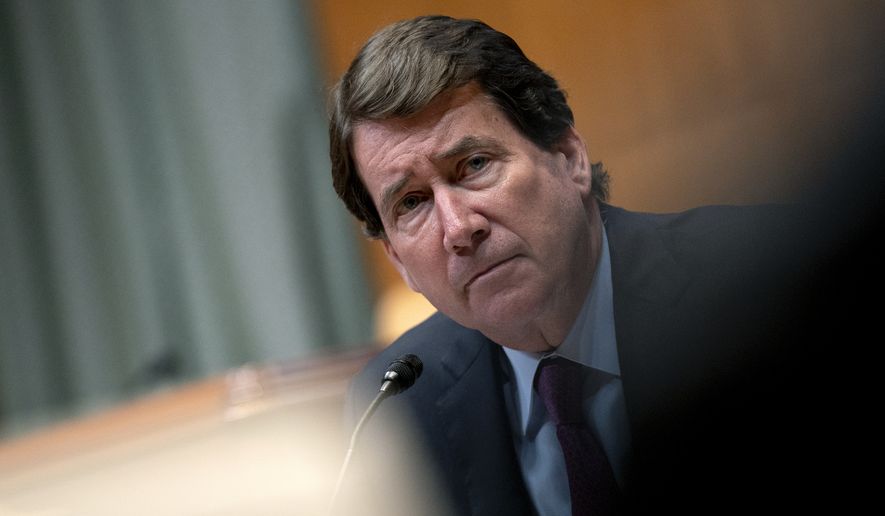Sen. Bill Hagerty is continuing to push for a “robust” debate on the $1.2 trillion infrastructure package, instead of allowing Senate Majority Leader Charles E. Schumer to ram the legislation through with limited amendments.
Mr. Hagerty, a Tennessee Republican, told The Washington Times he was refusing to sign off on a deal between Mr. Schumer and Republicans to expedite passage of the more than 2,700-page bill.
“I wasn’t elected by the people of Tennessee to be the most popular person in the Senate. I was elected to stand up for their interests,” said Mr. Hagerty. “I can’t in good conscience vote to accelerate a flawed bill that puts us another quarter of a trillion-plus in debt, especially when we haven’t had an opportunity to dig in and understand its substance or economic ramifications.”
Senate Democrats are pushing to pass the infrastructure bill this weekend so lawmakers can depart Washington for a month-long break. As such, Mr. Schumer has proposed to consider two-dozen amendments — out of more than 150 filed — before a final vote is held.
“We very much want to finish this important bill,” said Mr. Schumer. “We can get this done the easy way or the hard way.”
For the maneuver to succeed, however, all 100 members of the Senate have to acquiesce. At the moment, Mr. Hagerty is the only one refusing to do so.
“There are a lot of amendments that people want to get past. I’m not objecting to those amendments whatsoever,” he said. “A lot of them are good amendments that would make the legislation better, were they to pass … I’m also not trying to get any of my amendments included.”
Mr. Hagerty’s refusal to support jettisoning the Senate’s long tradition of unlimited debate comes as questions have emerged over the infrastructure bill’s funding.
Earlier this week, the Congressional Budget Office deemed the $1.2 trillion spending package improperly funded. The nonpartisan agency estimates that more than half of the $550 billion the package proposes in new spending is unfunded.
“That debt is going to be parked on the backs of our children and grandchildren,” said Mr. Hagerty. “And I haven’t heard anybody propose how to fix it. They just want to accelerate the passage of the whole thing.”
The opposition to Mr. Schumer’s timeline for passing the bill also underscores the tenuous position lawmakers find themselves in at the moment.
Most senators have had little time to properly review the bill. Text of the multi-thousand-page measure was only released last week after being crafted behind the scenes by President Biden and a bipartisan group of 10 lawmakers.
Mr. Hagerty says that process deprived senators and congressional committees of helping shape the final product.
“It’s certainly not the way a business person like me would approach anything,” said Mr. Hagerty. “It’s not moved through normal order, we have a series of committees … and that type of structure should have been used to properly vet and do the due diligence so you don’t have unintended consequences.”
The criticism is one that has been shared by even senior Democrats, who have bristled at how the drafting process has played out.
“They just sort of went on their own,” Sen. Benjamin Cardin, a Maryland Democrat who chairs the Senate Environment Committee’s subpanel on transportation and infrastructure, said recently. “That’s not the way they should have done it.”
While most lawmakers have had little time to properly review the bill, many privately admit it has sufficient support to become law. That was evidenced on Saturday when 18 Republicans voted with all 50 Democrats to break a filibuster and advance the legislation.
With passage assured, Mr. Schumer is rushing to dispense with normal Senate procedures and wrap up consideration of the bill. As part of that process, the majority leader is using which amendments will be included as leverage against both Republicans and Democrats opposing swift approval of the bill.
“It’s obvious that Senator Schumer is staging this in a way to put additional pressure on people,” said Mr. Hagerty. “He doesn’t care about good infrastructure. Clearly, if he did, he’d allow the amendment process to go forward.
The Tennessee Republican suggested Mr. Schumer was simply “checking a box” on infrastructure in order to move forward on his real goal: passing a $3.5 trillion social welfare bill.
The bigger legislation, which Democrats have dubbed “human infrastructure,” contains a slew of liberal priorities, including new climate-change regulations and amnesty for illegal immigrants.
Because those provisions are unlikely to garner GOP support, Democrats plan to pass it along party lines via budget reconciliation. The process allows spending measures to avoid the Senate’s 60-vote hurdle and pass with a simple majority of 51 votes.
“He’s the one controlling the schedule,” said Mr. Hagerty. “It’s not the infrastructure bill he cares about. He’s just trying to get to the $3.5 trillion … it’s my right to as a matter of conscience, not proceed with a process that puts us even faster at the doorstep of this $3.5 trillion package.”
• Haris Alic can be reached at halic@washingtontimes.com.




Please read our comment policy before commenting.